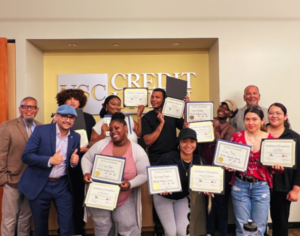Find everything you need to know all in one place, including:
- Home buying basics
- Mortgage loan options
- Step-by-step application process
- Post-closing next steps
Why buy?
Home ownership offers tax benefits, including a first-time home buyer tax credit.* Owning a home also builds your credit and your home equity as you pay your mortgage. That’s a smart way to prepare for the future.
How can I learn about home ownership?
Home buying comes with its own language, including terms like “amortizing” and “escrow.” We can help you decode the dialogue and make informed financing decisions:
- Home Buyer’s Guide eBook. This free resource covers a range of topics from loan options to how mortgages work, fees, and tips on selecting the right real estate agent. Download your guide today.
- Home Buying Seminars. Learn the basics of home financing at our free seminars. Our home lending experts discuss purchase options like term lengths, fixed vs. adjustable rates, low down payments, and how to make a winning offer.
Where do I start?
- Check your credit history. Order a copy of your credit report and address any outstanding issues. We evaluate scores from the three major credit reporting agencies: Experian, Equifax and TransUnion.
- Determine how much home you can afford. The general rule of thumb: Look for homes that cost no more than three to five times your annual household income (assuming a 20% down payment and moderate debt load).
- Calculate mortgage payments. Compare scenarios based on your income. Keep in mind property taxes and homeowners’ insurance usually factor into your monthly payment. Ditto for private mortgage insurance (PMI), which you’ll need if your down payment is less than 20%.
- Get prequalified. It’s the best way to determine how much money you can borrow and what price range to stay within.
- Use a real estate agent. Why navigate the home buying waters alone? A licensed real estate agent can provide valuable insights and guidance. And as a USC Credit Union member, you can take advantage of our Right Move® program, which offers a 20% commission rebate.1
Key Terms
Annual Percentage Rate (APR): Yearly mortgage interest rate for your loan, variable or non-variable.
Debt-to-income ratio: Percentage of monthly income you spend on monthly debt payments. Rule of thumb: Keep your total debt level at or below 36% of your gross monthly income.
Down payment: Initial payment for home purchase.
Fees: Catchall term for costs the home buyer normally covers (often negotiable), including home appraisal, borrower(s) credit report, title search, attorney, transfer taxes, deed recording, property taxes and more.
Interest rate: Percentage of mortgage loan amount lender charges to borrow money, typically based on current market conditions, personal credit score, down payment amount, and type of mortgage.
Loan term: Period of time to pay off mortgage balance. Shorter loan terms often come with higher monthly mortgage payments but lower interest rates.
Monthly mortgage payment: Amount paid each month toward your mortgage, which consists of:
- Principal. The more you pay against it, the more it reduces your outstanding mortgage balance.
- Interest. Portion that pays your mortgage lender for use of borrowed funds.
- Taxes. Portion that goes to property taxes charged by your local government.
- Insurance. Portion that pays homeowners or hazard insurance coverage for losses from property damage.
Depending upon your property location, property type, and loan amount, you may have other monthly or annual expenses such as mortgage insurance, flood insurance, or homeowner association fees.
Origination charge: Fee lenders and brokers receive for overseeing the loan process, from application status to completion, which includes document preparation, underwriting costs and other fees.
Points: Fees paid to mortgage lender or loan broker. One point equals 1% of your mortgage amount.
PMI (Private Mortgage Insurance): Insurance that covers borrowers with a down payment less than 20% of the home value. PMI protects the mortgage lender if the borrower fails to pay back the loan.
Depending on the loan amount and type and location of your property, you may have other monthly or annual expenses such as mortgage insurance, flood insurance, or homeowner association fees.
How much can I borrow?
Use our mortgage loan calculator to estimate monthly payments and try out different scenarios based on your income.
Before you apply, you need to understand your mortgage loan. We’re committed to making your loan and application process simple and straightforward. Reach out if you have more questions.
Step 1: Prepare the essentials. Gather up and submit legible, complete copies of these income and assets documents as soon as possible.
Income
- Pay stubs for your last 30 days of employment
- Past two years of W-2 forms and/or 1099s for each borrower
- Past two years of 1040 federal tax returns
- Past two years of federal business tax returns and/or K1s (for self-employed borrowers)
Assets
- Past two months of bank statements, including checking, savings, money market, CDs, stock portfolios, etc.
- Past two months or quarterly statements for retirement accounts
Step 2: Start your application. Your USC Credit Union home mortgage consultant will follow up and ask for the financial and property information you’ve gathered.
- Call us at (877) 670-5860, Mon-Fri, 9:00 am – 5:00 pm PST
- Complete our contact form to have a mortgage lender reach out.
- Start your prequalification and application online.
Step 3: Provide supporting documentation. With the required documentation in hand, your home mortgage consultant will:
- Order a credit report and request any additional documents needed
- Provide important disclosure documents for you to review, sign and return, including (but not limited to):
- Loan Estimate that breaks down and estimates closing costs and shows loan terms, monthly payment, annual percentage rate (APR), and costs of making and closing the loan, including finance charges
- Notice of Intent
- Check or completed Withdraw Authorization Form to cover appraisal and credit report
- Request any additional information, depending on where you are in your home buying process, including:
- Purchase contract
- Agent and escrow contract information
- Homeowners Association (HOA) contact information or statement to verify monthly dues (condos or townhomes only)
Step 4: Choose a lender you know and trust. With USC Credit Union’s home mortgage team by your side, you can feel confident about your first-time homebuyer process from application to closing.
I’ve submitted my mortgage application. Now what? Well done! Completing a mortgage application is no small feat. Now your lender will:
- Evaluate your credit report to support your history of on-time bill and debt payments.
- Verify your employment, income and financial information.
- Evaluate your current and future ability to make payments.
- Evaluate your cash assets, including cash on hand, savings and investments.
- Order a home appraisal, title insurance and flood certification.
- Send you a list of conditions to meet before you can prepare to close your loan.
- Issue a Commitment Letter with final approval of your mortgage loan and loan terms. Note: You’ll need homeowners insurance to close your loan. Get competitive quotes from multiple insurance providers, including Trojan Insurance Services.
Closing Process. Closing or “settlement” is when you sign the final mortgage documents, and the property is legally transferred to your ownership. Before your closing, you’ll receive the final figures for the transaction, including closing costs, escrow costs and the down payment amount. If money is due at the time of signing, you’ll want to obtain a cashier’s check or wire transfer. Your lender will send the closing documents to your closing agent. On closing day, review the following documents carefully with your agent, then sign and date them:
- Mortgage Note (your contract)
- Mortgage or Deed of Trust
- Final Closing Disclosure
- Affidavits and Declarations
- Final Closing Statement
Important Tips:
- Read the closing documents and go over them with your real estate agent prior to the closing date to understand everything you’re required to sign. Questions? Ask away!
- Provide accurate information on your loan application. Discrepancies in your credit or employment history or current bank account balances could delay your application.
- Promptly submit any additional documentation as requested.
- Consider having an attorney review your loan documents or attend the closing with you.
- Do not make big purchases, take on additional debt or make large deposits or transfers unrelated to your loan until after your closing.
View account activity, transfer funds, make payments and more. USC Credit Union makes it easy to manage your mortgage account online.
Access detailed account information
- View balance, principal and interest payments, current interest rate and escrow details
- Get comprehensive tax and interest data
View online statements
As a USC Credit Union member, you automatically receive online statements. If you’re still receiving statements by mail, go paperless here. Online statements have the same information and are more secure than paper statements.
Make payments
- Pay your mortgage from a checking or savings account at USC Credit Union or another financial institution
- Make free same-day payments to your mortgage account or set up a single payment or automatic schedule
- Access our loan servicing provider online 24/7 to make payments, print coupons, view loan history and obtain current loan statements and 1098 year-end tax information.
TIP: Do not make big purchases, take on additional debt or make large deposits or transfers unrelated to your loan until after your closing.
Government-backed loans that offer lower down payment requirements and flexible credit standards. Ideal for low-income, first-time borrowers, DACA, ITIN, and active currently military, veterans, and their surviving spouses.
Benefits:
- Low minimum down payments and loan options with no money down
- Lower interest rates and closing costs
- Higher debt-to-income ratios relative to other loan types
Buying a home is exciting – and complex. Count on our team of experienced home-lending professionals to guide you through every step of the process.1 We put together a guide to help you buy your first home with confidence. Find everything you need to know all in one place, including:
- Home buying basics and loan options
- Step-by-step application process
- Post-closing next steps
Home Loan Options
Compare the features and benefits before you choose a home loan. Learn more here.
| Want to… | Best loan for you… | It works because… |
|---|---|---|
| Have the same monthly payments for the life of the loan? | Fixed-Rate |
|
| Have lower monthly payments at the beginning of your loan? | Adjustable-Rate |
|
| Buy your home with a lower down payment? | Fixed or Adjustable |
|
| Buy a bigger home? | Jumbo Loan (Fixed or Adjustable) |
|













